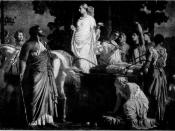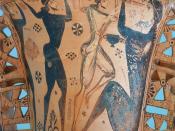The Odyssey
Can Odysseus reflect the cultural values of ancient Greece through his super
human qualities? Odysseus is the hero of the Odyssey, an epic poem believed to
have been composed by Homer, a blind poet, in about 800 B.C. An epic is a long,
narrative poem that tells about the escapades of a hero who reflects the ideals
and values of a nation or race. Odysseus, though he often seems
larger-than-life, reflects the cultural values of ancient Greece.
Physical strength is a quality that was greatly emphasized throughout the
Odyssey. In this epic, Odysseus is depicted as a very strong man who defeats
numerous foes, such as the Cyclops, Scylla, and Circe during his journey home to
Ithaca following the Trojan War. Upon returning home to Ithaca, Odysseus
displays his immense strength once more with the stringing of his bow, which was
very large and required a great deal of physical power to use.
"But the man
skilled in all ways of contending . . . so effortlessly in one motion strung the
bow" (Odyssey Book 21 197-203). Of the one hundred men in Odysseus' home, not
one had the strength or expertise to string his bow, but Odysseus was able to
string it and shoot with it very easily. Odysseus' great display of power shows
that physical strength was a highly regarded trait in ancient Greece.
Hospitality to guests was also very important to the ancient Greeks. The Greeks
believed that Zeus, who they believed was the god of hospitality, would punish
any person who was not hospitable to a guest. In the Odyssey, Odysseus and his
men land on the island of the Cyclopes, where they explore a cave and become
trapped inside by a savage Cyclops named Polyphemus. Odysseus warned Polyphemus
that Zeus would punish any person that mistreats a guest. "We would entreat you,
great Sir, have a care for the gods' courtesy; Zeus will avenge the unoffending
guest" (Odyssey Book 9 173-175). The Cyclops ignored this warning and devoured
several of Odysseus' men, and afterwards Odysseus blinded him with a sharpened
staff, and told him that it was punishment for being inhospitable to Odysseus
and his crew. It was an important cultural value of the ancient Greeks that a
person should accept any stranger into their home and treat them with courtesy,
and even present them with gifts.
Revenge was another value in the times of ancient Greece. In the Odyssey
revenge is taken several times by those who have been wronged. When the Cyclops
ate Odysseus' men, Odysseus avenged this by blinding the Cyclops. Even gods
sought revenge in the Odyssey. When Odysseus and his crew landed on Thrinacia,
the island of the sun god Helios, and ate Helios' cattle, Helios asked Zeus for
payment for the loss of his cattle. Zeus sent down a thunderbolt, sinking
Odysseus' ship and leaving Odysseus as the sole survivor. Again revenge was
sought when Odysseus returned home to Ithaca, and found that one hundred men had
invaded his home, seeking to wed his wife, Penelope, and take over his fortune.
"There will be killing till the score is paid. You forced yourselves upon this
house. Fight your way out, or run for it, if you think you'll escape death"
(Odyssey Book 22 296-299). Odysseus killed all of the men in his house to avenge
his home and family. The ancient Greeks felt that if a person was wronged, they
should seek revenge, and so people in ancient Greek valued vengeance.
Odysseus reflects the ancient values of physical strength, hospitality, and
revenge. However, several of these traits are not as important in current times.
Revenge is now unacceptable, though the ancient Greeks embraced it. Physical
power is still appreciated, but the significance of hospitality has decreased to
a great extent. No longer would a person accept a stranger into their home with
alacrity, but would be more likely to turn the foreigner away. Odysseus,
although he often seemed to be unrealistic, showed qualities that were greatly
esteemed by the ancient Greeks.


